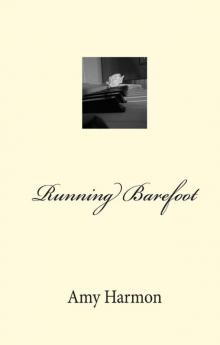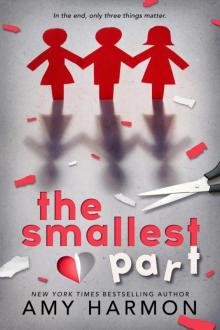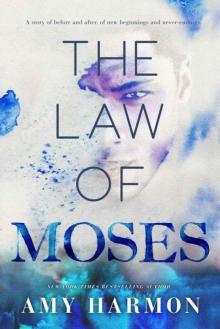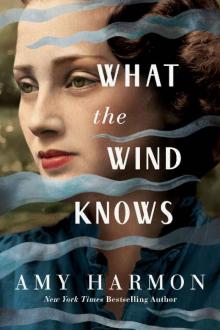- Home
- Amy Harmon
A Different Blue Page 3
A Different Blue Read online
Page 3
Just like trash. And no amount of pretending I wasn't trash would make me something else. Girls like me deserve their reputations. I cultivated mine. I suppose I could blame my upbringing, but it wasn't in me to make excuses for myself. I like boys and boys like me. Or at least they like the way I look. I guess it would be a lie to say they like me, the me I keep to myself. They don't know that girl. But that's part of the allure. I cultivated my look, too. I had sexy hair, and I always wore my jeans too tight and my shirts snug and my eye makeup thick. And when I was being held or kissed or touched, I felt powerful and I felt wanted. I knew what some people called me. I knew the whispers behind the hands. I knew what the boys said about me. They said I was a slut. Pretending I wasn't would be believing a lie. A myth, like the Greeks with their silly Gods.
Jimmy had called me Bluebird. It was his own little nickname. But I bore no resemblance to a bluebird . . . sweet, bright, happy. I was more like a modern day harpy. A bird-woman. A female monster equipped with crooked, sharp talons. Mess with me, and I would carry you off to the underworld and punish and torment you for infinity. Maybe it wasn't my fault I was the way I was. Cheryl took me in when I was about eleven, and she didn't have much use for a kid. Her lifestyle wasn't conducive to motherhood. She was unaffectionate and absent most of the time, but she was all right. When I was younger she made sure I ate and that I had a bed of my own.
We lived in a two bedroom apartment in a dumpy complex on the outskirts of Boulder City, twenty minutes from the bright lights of Las Vegas. Cheryl was a dealer at the Golden Goblet Hotel Casino in Vegas, and she spent her days sleeping and her nights surrounded by gamblers and cigarette smoke, which suited her just fine. She usually had a boyfriend. The older she got, the more seedy her choice in men became. The older I got, the more interested they became in me. It made for a tense relationship. I knew that as soon as I graduated I would be on my own because the money for my care had stopped at eighteen, and I had turned nineteen in August. It was just a matter of time.
When class was over, I wadded up my paper and threw it back in the trash where it belonged. Mr. Wilson saw me do it, but I didn't care. Both Manny and Graciela were sitting on my tailgate talking to group of Manny's girlfriends when I reached the parking lot. I just sighed. First Manny, now Graciela. I was becoming the chauffeur. They were all laughing and chattering, and my head immediately started to hurt. One of the girls called out to a handful of guys gathered around a vintage yellow Camero.
“Brandon! Who are you taking to Homecoming? I still need a date, ya know!”
The girls around her twittered, and Brandon looked over to see who was propositioning him. Brandon was the younger brother of a guy I hung out with every now and then. Where Mason was brawny and dark, Brandon was lean and blond, but both were too good-looking for modesty. Mason had graduated three years before, and Brandon was a Senior, like I was. I was older than all the guys my age, and though I could acknowledge good looks, I grew bored with them very easily and didn't make it a secret. Which is probably why I would NOT be crowned Homecoming Queen, despite Manny's high hopes and machinations.
“Sorry, Sasha. I asked Brooke last week. We definitely need to hang out sometime, though.” Brandon smiled, and I was reminded how appealing Mason was when he was being sweet. Maybe it was time to give Mason a call. It had been a while.
“That car is seriously hot, Brandon,” Manny called out, his voice raised above those of his friends.
“Uh, thanks, man.” Brandon grimaced, and his friends looked away awkwardly. I winced for Brandon's sake and for Manny's.
“Manny, Gracie, let's go.” I yanked my truck door open, hoping the loafers on my tailgate would scatter when I started it up. I watched through the rearview mirror as all of Manny's friends gave him hugs and made him promise to text. Gracie seemed transfixed by Brandon and his friends, and when everyone dispersed she was still sitting on the tailgate staring. Manny tugged on her, pulling her out of her reverie, and the two of them hopped in beside me. Graciela had a dazed look on her face, but Manny was pouting.
“I don't think Brandon likes me,” he mused, looking at me for feedback.
“Brandon is so hot,” Graciela sighed.
I cursed derisively. Wonderful. Brandon was waaaay to old for Graciela, and I wasn't just talking age. Graciela was small and pretty, but she was immature, both physically and emotionally. And she was spacey in a very “look at all the pretty flowers” kind of way. It was a good thing she had Manny. Otherwise she might just wander around in a pleasant fog. Both Manny and Graciela were unfazed by my language, continuing on as if they hadn't even heard me.
“In fact,” Manny huffed, “I don't think any of Brandon's friends like me, either. And I am so nice!” Manny seemed genuinely befuddled.
“Do you think Brandon likes me, Manny?” Gracie pondered dreamily.
Manny and I ignored her. I decided it might be time to give Manny a little advice.
“I think maybe the guys are confused about how to treat you, Manny. You're a guy but you hang out exclusively with girls, you wear fingernail polish and eyeliner, and you carry a purse . . .”
“It's a slouchy bag!”
“Fine! How many guys carry slouchy bags in rainbow colors?”
“It's just a backpack with flare!”
“Okay. Fine. Forget the backpack. You openly remark on how hot this or that guy is . . . including freaking Wilson, yet in the very next breath you are flirting with the head cheerleader. Are you gay? Are you straight? What?”
Manny seemed stunned that I would just come out and ask, and he stared at me with his mouth agape.
“I'm Manny!” Manny shot back, folding his arms. “That's what I am. I'm Manny! I don't know why I can't compliment a cute guy and a cute girl! Everybody needs positive reinforcement, Blue. It wouldn't hurt you to give some every once in a while!”
I banged my head against the steering wheel, frustrated by my obvious inability to communicate, wondering if maybe he was the only one in high school who wasn't afraid to be himself. Maybe it was the rest of us who needed to figure ourselves out.
“You're right, Manny. And believe me, I wouldn't change a hair on your head. I was just trying to explain why some people might have trouble relating.”
“You mean why some people might have trouble accepting,” Manny sulked, looking out his window.
“Yeah. That too,” I sighed and started up my truck. Manny forgave me about ten seconds into the ride and chattered the rest of the way home. Manny couldn't stay angry unless, of course, someone messed with Graciela. Then all reason left him and his mother joked that he became a raging chihuahua. I'd only seen it happen a few times, but it was enough to make me never want a chihuahua. Apparently, since I'd only pointed out his flaws, I was immediately forgiven and back in his good graces with barely a snarl.
When I got home the heat inside the apartment felt like the bowels of hell. It didn't smell very good either. Stale cigarettes and spilled beer mixed with 90 degree October heat wasn't a pleasant combination. The door to Cheryl's room was shut. I wondered at her ability to sleep in the heat and sighed as I emptied the ashtrays and wiped up the beer spilled on the coffee table. Cheryl obviously had company. A pair of men's jeans lay in a crumpled pile and Cheryl's black bra and work shirt were tossed alongside them. Nice. The sooner I got out of there, the better. I stripped my jeans off and pulled on a pair of cut-off sweats and a tank-top, pulling my hair up in a sloppy ponytail. Shoving my feet into flip-flops, I left the apartment ten minutes after I had arrived.
I rented a storage unit behind the complex for fifty bucks a month. It had lights and power, and it was my own little workshop. It had a couple of work tables fashioned from sawhorses and long sheets of plywood. I had a large dremel, various sizes of mallets and chisels, files and grinders, and an oscillating fan that moved the hot air and sawdust around in lazy circles. Projects in various stages, from a discard pile to completed pieces of twisting, gleaming art decorated the perime
ter of the space. I had found a thick, gnarled branch of Mesquite on my travels the day before, and I was eager to see what it looked like under the layers of thorny bark that I had yet to strip off. Most people who worked with wood liked to use soft woods because they were easy to carve and whittle, easy to shape into their own creation. Nobody carved with mesquite or mountain mahogany or juniper. The wood was too hard. The ranchers out west considered mesquite a weed. You couldn't use a sharp knife to shape it, that was for sure. I had to use a big chisel and a mallet to strip off the bark. When the wood was laid bare, I would usually spend a great deal of time just looking at it before I did anything. I had learned that from Jimmy.
Jimmy Echohawk had been a quiet man, quiet to the point of not talking for days at a time. It was amazing that I had any language skills at all when I came to live with Cheryl. Thank you, PBS. When I was two years old, my mother – at least we assume it was her – left me in the front seat of his truck and drove away. I didn't remember my mother at all, beyond a vague memory of dark hair and a blue blanket. Jimmy was a Pawnee Indian and had very little that he called his own. He had an old pickup truck and a camp trailer that he pulled along behind it, and that's where we lived. We never stayed in one place for very long, and we never had company, except for each other. He said he had family on a reservation in Oklahoma, but I never met any of them. He taught me how to carve, and the skill had saved me, both financially, and emotionally, many times. I lost myself in it now, working until the early hours of morning when I knew Cheryl would be gone to work, along with her mystery man, and the apartment would be empty.
Chapter Three
“When Julius Caesar crossed the Rubicon, he knew what it would mean.” Mr. Wilson was looking at us all somberly, as if Julius Caesar was his homey and he had just crossed the Rubics Cube yesterday. I sighed and tossed back my hair, slouching even further into my seat.
“It was considered treason to bring a standing army into Italy proper. The senators in Rome were intimidated by Caesar's power and his popularity. They wanted to control him, see, and it was fine if he was winning battles for Rome, conquering the Celtic and Germanic tribes, but they didn't want him to become too rich or too popular, and that was exactly what was happening. Add to that Julius Caesar's own political ambitions, and you have a recipe for disaster . . . or the very least, civil war.”
Mr. Wilson walked down the aisle, and I noticed in surprise that he seemed to have the attention of my classmates. They were watching him closely, waiting for what he would say next. He didn't use notes or read from a textbook or manual. He just talked, like he was relating the highlights of a killer movie.
“Caesar had some friends in high places. They snooped around, whispered in a few ears, and blatantly tried to influence the Senate. But the Senate wanted no part of it. They told Caesar to disband the army and resign his position, or risk becoming an 'enemy of the state.' We use the same term today in the US government. It basically means the government finds you guilty of crimes against your country. People who sell national secrets, spy for another country, that kind of thing, are deemed 'enemies of the state.' Very 007 without the glamour or the amazing stunts or the fit Bond girls.”
I found myself smiling as the rest of the class laughed, and I marveled that I'd forgotten for a moment that I didn't like Mr. Wilson.
“Plus, can you imagine what that label would do to someone? Some would argue that such a label is used as a political tool – a tool to repress or intimidate. You charge someone with being a traitor to their country, an 'enemy of the state' and their life is over. It's like accusing someone of being a child molester. It wasn't any different in Ancient Rome. So we have Julius Caesar, ambitious, angry that he is being told he can't lead his army anymore, and basically being threatened with ugly labels and treason.
“Long story short, he brings his army to the banks of the Rubicon, which doesn't exist today, so no one really knows if it was just a little stream or a substantial river, and he stands there, thinking. He says to his men. 'We can still retreat. It's not too late, but once we pass this bridge, we will have to fight.'”
“You said he was rich, right? Why didn't he just take his money and go. Say to hell with the Senate, let them run the army, conquer people, whatever. They didn't appreciate him, fine. What was the point? What did he have to prove?” I found myself asking the question before I even realized I was saying the words out loud. I felt the heat of embarrassment travel up my cheeks. I never asked questions in class.
Mr. Wilson didn't act surprised that I was participating, and he immediately answered. “He was rich, he was powerful. He could have retired to Gaul, lived in the lap of luxury, and been fed grapes for the rest of his life.” Everyone laughed. I scowled. Mr. Wilson stopped in front of my desk and looked down at me quizzically.
“Why do you think he took his army into Rome, Blue?”
“Because he was a bloody peacock, and he wanted to be king,” I responded immediately, trying to mimic his accent. The class burst into laughter once more. “And because he didn't like being used or controlled,” I finished more quietly, without the accent.
“I think you're right on both accounts.” Mr. Wilson shifted away, drawing the rest of the class into the conversation. “It ends up that Julius Caesar grabbed a trumpet and ran to the bridge. He sounded the advance with a blast of the trumpet and cried out . . . and I am quoting, 'Let us go where the omens of the gods and the crimes of our enemies summon us! The dye is now cast.' What do you think that means? The dye is now cast.”
The classroom was silent. Of course there were kids who knew the answer, but, per usual, no one raised their hand.
“The deed is done, your goose is cooked, the milk is spilled, your bed is made,” I droned in a very bored voice.
“Yes,” Wilson ignored my tone. “It was in the hands of destiny. He had crossed the Rubicon and there was no turning back. We all know what eventually happened to Julius Caesar, yes?” No, we didn't. I did, but I was through being the star student.
“Julius was murdered – a murder plotted with the help of his friend. Shakespeare wrote a wicked play called Julius Caesar, which you have all been assigned to read and which you will be tested on this Friday.” Moaning commenced, but Wilson just smiled. “I told you, literature tells the history so much better than the text books, and it's infinitely more enjoyable to learn it that way. Quit your whingeing. You'll thank me someday.” Whingeing? That was one I hadn't heard before.
“So Julius Caesar crosses the Rubicon, rushing to his destiny. And it was a destiny both glorious and tragic. He reached the very pinnacle of power, and in the end he discovered power is an illusion.
“So that brings us to round three, people. Feel free to add pages as you need. This is the assignment we started the first day of school. And it's just going to keep on growing. You've written some of your history, at least in broad terms. Now I want you to take one moment from your life. A moment where the dye was cast, where you crossed your metaphorical Rubicon and you couldn't go back. I want you to tell me how it formed you or changed you. Maybe it was something that was beyond your control, something that happened to you, or maybe it was an actual decision you made. For better or worse, how did it affect the direction of your story?”
One by one, Wilson started passing papers to my classmates, making a comment here or there. I sighed, remembering how I had thrown mine in the trash. Again. The classroom got quiet as people got to work. I tore a clean sheet of paper from a notebook and prepared to start over. Wilson was suddenly standing in front of my desk, which unfortunately had remained right on the front row since he had assigned us to the seats we had “chosen” on the first day of school.
He laid a sheet of paper on my desk. I looked down at it in surprise. My eyes shot up to his and then back down to my paper. It was the paper I had thrown away. Twice. He must have retrieved it after I left the room that day. It had been smoothed and pressed flat again, as if he had laid it between a couple of h
eavy books. My words stared back at me, almost mocking.
“There's no sense in running from the past. We can't throw it away or pretend it didn't happen, Miss Echohawk. But maybe we can learn something from it. You have an interesting story, and I'd like you to tell me more.” He turned to walk away.
“Seems a little unfair to me,” I blurted out, and I immediately wished I had kept my big mouth shut when thirty pairs of eyes zeroed in on me.
Wilson raised his eyebrows, tilted his head inquisitively and folded his arms.
“What do you mean?” he asked quietly. I expected him to get red in the face or kick me out. That's usually what happened in my other classes when I couldn't keep my sassy comments to myself.
I shrugged and popped the gum I wasn't supposed to be chewing. “You ask us to bare all, write our little secrets down, our lowest moments, but I don't see you sharing anything personal with us. Maybe I don't want you to know my story.”
The class was quiet. Shockingly so. It seemed everyone was holding their breath, waiting to see if Blue Echohawk had finally gone too far. When Wilson didn't explode but merely eyed me owlishly for several long seconds, the tension eased somewhat.
“Okay. Fair enough,” Wilson acquiesed quietly. “But I am the teacher, which by definition means I instruct and you learn, so things are not going to necessarily be fair because we have different roles. And in the interest of time, I'm not going to spend the class period talking about myself.”
“How about twenty questions?” somebody spoke up from the back of the class.
“Or spin the bottle,” someone else shouted out, and a few people snickered.
“Tell you what. I will give you a brief timeline, just like you've done for me, and then I'll tell you my turning point moment. Deal? That way Miss Echohawk can be confident that everything is fair.” He winked at me, and I resisted the urge to stick out my tongue. Teachers were not supposed to be young and cute. Somehow that really irritated me. I just arched one eyebrow disdainfully and looked away.

 Prom Night in Purgatory
Prom Night in Purgatory Running Barefoot
Running Barefoot The Queen and the Cure
The Queen and the Cure The Smallest Part
The Smallest Part The Bird and the Sword
The Bird and the Sword The Song of David
The Song of David Infinity + One
Infinity + One The Law of Moses
The Law of Moses A Different Blue
A Different Blue From Sand and Ash
From Sand and Ash What the Wind Knows
What the Wind Knows Slow Dance in Purgatory
Slow Dance in Purgatory Romance Through the Ages
Romance Through the Ages